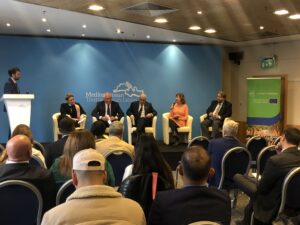Mediterranean Tourism Forum Masterclass – ‘Cleaner Mobility – Bumpy Road Ahead?’
Malta, 23/10/2023
‘Cleaner Mobility – Bumpy Road Ahead?’
The annual Mediterranean Tourism Forum gathered esteemed experts to navigate the challenges and opportunities inherent for a more sustainable Mediterranean tourism agenda. Dr Suzanne Maas, on behalf of EIT Urban Mobility RIS Hub Malta was invited to participate in a masterclass titled “Cleaner Mobility – Bumpy Road Ahead?”, which delved into the profound importance of sustainable mobility in shaping a brighter tomorrow, with a specific focus on its impact on the tourism, travel, and hospitality sectors.
Opening the discussions, Josianne Cutajar, MEP, underscored Malta’s unique position as an island state, emphasising the imperative of tailoring mobility policies to address its distinct geographical constraints. Cutajar highlighted the limited transportation links, primarily reliant on ferry and air connections, emphasising the necessity of aligning mobility strategies with the island’s specific context.
The panel discussion, moderated by Stephan Piazza, featured prominent figures including David Curmi, Chairman of AirMalta; Attila Benedek, Transport Policy Expert at the EU; Dr. Suzanne Maas, PAF, PhD Sustainable Mobility University of Malta; Jeanette Axisa, Chief Officer, Transport Malta; and Mike Jordanou, Transport Expert WSP.
Insights from a carrying capacity study revealed that traffic and parking significantly impact tourist satisfaction negatively, while there has been an uptick in satisfaction with public transport. Dr. Maas highlighted the positive impact of modernising the bus service but stressed the need for more efficient public transport solutions, advocating for dedicated bus lanes and a potential mass transit system.
Apart from public transport use, tourists’ travel habits in Malta have evolved towards other modes, including harbour ferries, shuttles, on-demand, and ride-hailing services. Promoting these options could greatly benefit from a well-designed travel planning or Mobility-as-a-Service (MaaS) app. In addition to this, Dr.Maas underscored the potential to stimulate walking and cycling tourism by enhancing urban landscapes to prioritise these modes of travel and proposed widening pavements to include green infrastructure and shade, a connected cycling network and measures to improve road safety, particularly for vulnerable road users.
Addressing concerns about emissions in the aviation sector, Dr. Maas urged a holistic approach to reduce trips and shift towards cleaner transport modes. She advocated the ‘Avoid-Shift-Improve’ strategy, urging limitations on aviation industry growth, emphasising quality tourism based on eco-tourism principles, and investing in alternative connections to Malta to provide an alternative to flying, by connecting to the European (night) rail network, integrating the train and ferry networks, and shifting to cleaner maritime vessels.
In her closing remarks, Dr. Maas stressed the importance of aligning efforts with carbon emission reduction targets outlined in the Paris Agreement, emphasising the imperative of preserving the planet for the sake of human survival.
The Mediterranean Tourism Forum served as a pivotal platform for thought-provoking discussions, highlighting the urgency for collaborative efforts towards sustainable mobility in Malta’s tourism landscape.